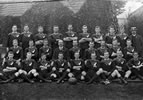The South African War
Ten contingents of some 6,000 New Zealand men served in South Africa from 1899 to 1902. Of these, 230 died, over half from disease. Their actions were followed closely at home. Though the men left in response to ‘the call of mother England’ and to ensure, in the words of Premier Richard Seddon, that ‘our race … could and should be the dominant race of the world’, national pride became important. 1 Newspapers quoted observations about ‘our boys’ and reprinted letters from soldiers comparing themselves with others.
Perfect physical specimens
Older images were confirmed, and new ones established. The New Zealanders were said to be (again quoting Seddon) ‘as perfect in physique as it falls to the lot of the most favoured of our race to be’. 2
Colonial giants
Describing the New Zealand troops in South Africa, an English officer said, ‘I don’t suppose there is a man under six feet, and I should say quite half of them go up to 6ft. 4in. or 5in.’ In fact their average height was 5 ft 9½ in. (1.76 m). 3
The New Zealand soldiers were strong, courageous and adaptable, toughened by a pioneering heritage and experience of the frontier. Cool under fire, they were natural leaders who had initiative and were not crippled by English red tape. They were said to be a classless group whose obedience derived from loyalty to mates, not respect for officers. Despite such plaudits, the New Zealand troopers were seen as modest heroes with ‘not the slightest pretension’ or ‘self-glorification’. 4
The British had less confidence in their own men. Many recruits had been rejected on medical grounds, and a 1904 parliamentary committee on the ‘physical deterioration’ of the race raised fears that Britain’s urbanisation was making men soft. In this context the success of the colonial troops was reassuring.
The All Blacks
The point became clearer in 1905 when New Zealand’s All Black rugby team toured England and Wales. Their phenomenal success on the field encouraged British observers to suggest ‘a great historical and ethnological fact’: in the colony the transplanted Britisher was made better 5 . New Zealand’s bracing climate, her outdoor life and lack of cities made men stronger and larger.
Internalising these views, New Zealanders saw a distinctive role for themselves in preserving the race and empire from decadence. The qualities of the players were generalised into characteristics of the country’s people – their cleverness on the field could be read as colonial initiative and versatility, their teamwork as mateship and lack of class division. When they returned to cheering crowds and a formal welcome by the so-called ‘Minister of Football’, Richard Seddon, they were praised because the flattery had not ‘turned their heads in any degree’. 6


